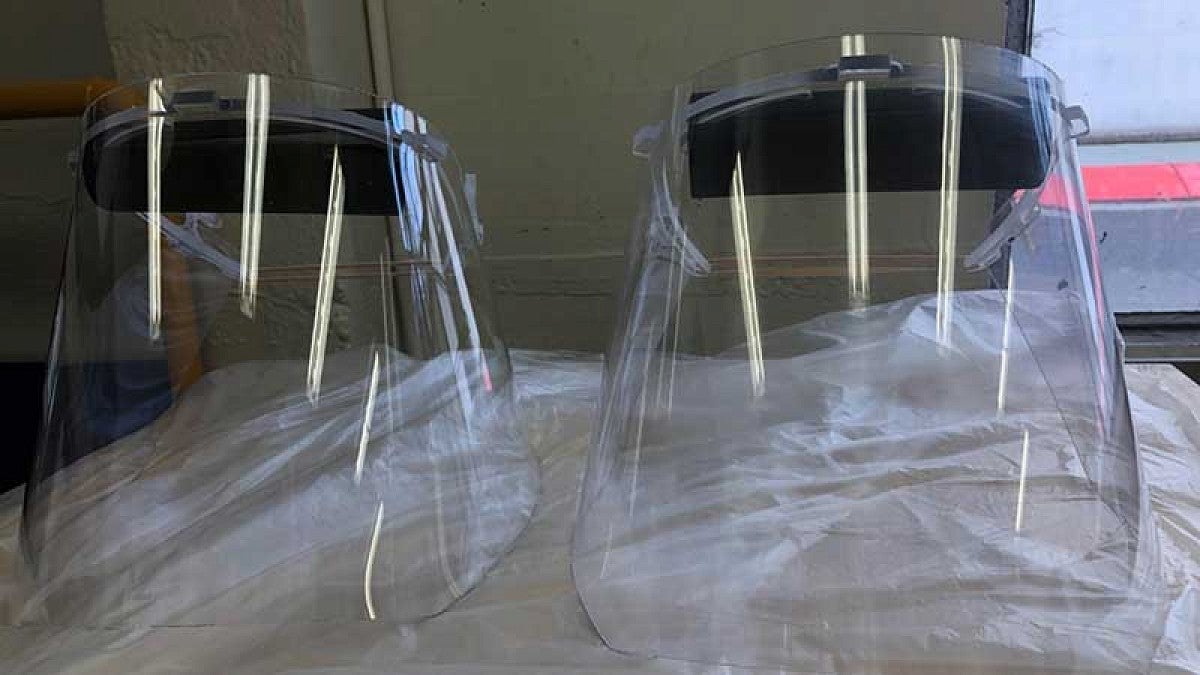In more normal times, workers in the UO’s Technical Science Administration, the UO’s scientific instrument machine shop, might be busy welding titanium plasma shields or fabricating photovoltaic test beds.
But for the past week, the seven-member team has been busy getting ready to produce face shields to aid in the fight against COVID-19.
“The UO has a lot of specialized equipment that allows us to fabricate lots of different types of composites with high throughput,” said Michael Pluth, a professor in the Department of Chemistry and Biochemistry and an associate vice president for research. “Using that capacity to impact the COVID-19 response is really important.”
The university is developing a plan to make face shields available directly to medical providers. Face shields cover the entire front and sides of the face and are considered vital personal protective equipment for medical workers, emergency responders and others on the front lines of the battle against the coronavirus.
The production of face shields is part of a larger effort by the UO to fabricate equipment to assist in the battle against the coronavirus. A group of 3D printing experts is examining whether the UO can aid in the production of ventilator parts and other materials in short supply during the global health crisis.
Workers in the machine shop, which produces high-precision instruments for UO science labs, are using a water-jet cutter to fabricate the face shields. The shields protect the wearer's face from body fluids and can be worn in conjunction with masks.
Water jet cutters slice through metal or other materials using a jet of water at high velocity and pressure, or a mixture of water and an abrasive substance. The instruments are commonly used during fabrication or manufacture of parts for machinery and other devices.
The technical services machine shop has already produced several prototypes of the face shields and are preparing for an initial run of about 200-250. The shop will then stockpile enough materials for a second run of the same quantity. Currently, the shop can produce about 100 face shields per day. Finished products are cleaned with alcohol and individually packaged, and they can be sterilized in an autoclave.
“It is a good example of a project that we can do to help the community that leverages our strengths in design and rapid prototyping,” said technical services director John Boosinger.
Staffed by professional machinists and electrical engineers who support internal and external research projects through the design and construction of lab equipment, the shop is one of the UO’s research core facilities, which provide researchers, industry partners and students with access to the latest instrumentation and services.
In addition to developing unique high-tech components with cutting-edge fabrication techniques, the facility also trains students and faculty members in the safe operation of shop tools in order to further both research and education.
The shop employs three students, including student shop manager Geordi Helmick, a senior who has been helping lead the operation while also completing remote coursework in support of her bachelor of fine arts in art and technology.
“I always look forward to going to work and fabricating scientific equipment,” Helmick said “But there is an extra satisfaction in knowing the work we are doing right now can really help medical workers save lives.”
—By Lewis Taylor, University Communications


